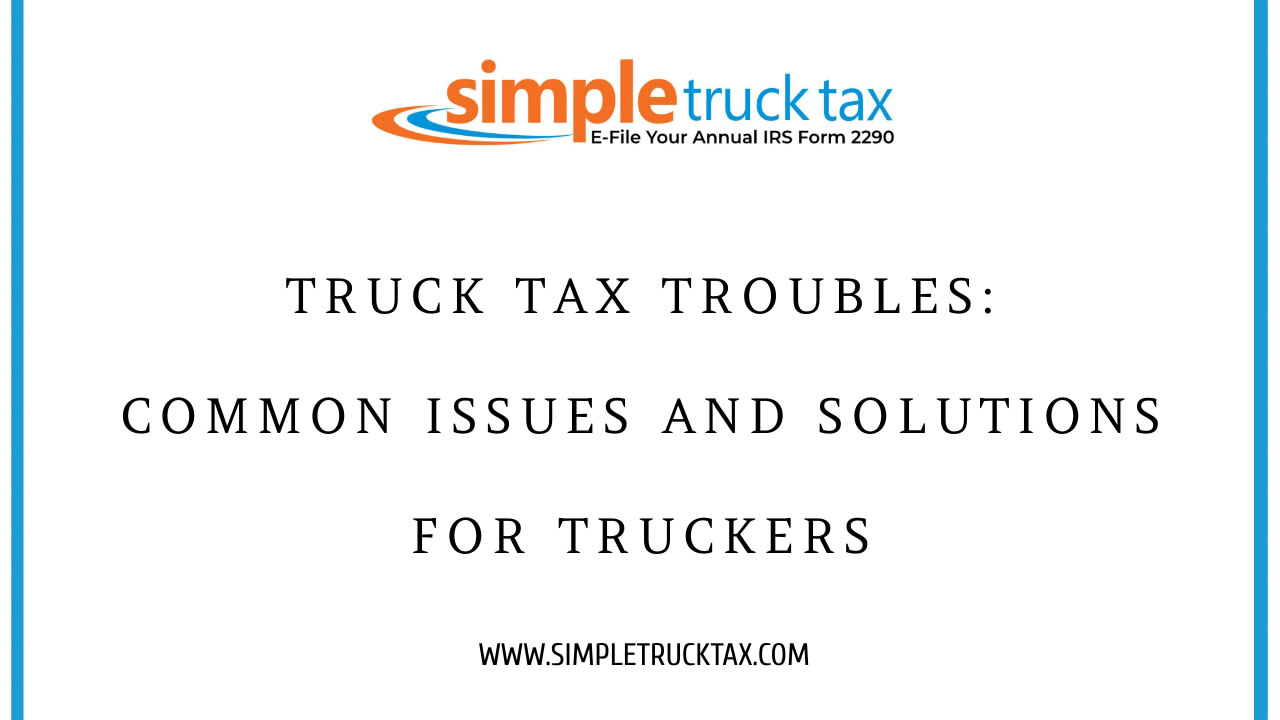
Truck Tax Troubles: Common Issues and Solutions for Truckers
To truckers, the thicket of taxes is daunting. With unique regulations and requirements it becomes easy to be overwhelmed. We aim to discuss typical tax concerns always faced by truckers and provide practical solutions that will help you keep compliant whilst maximizing your earnings.
Knowing Heavy Vehicle Use Tax (HVUT)
What is HVUT?
The Heavy Vehicle Use Tax (HVUT) is an annual financial charge imposed on heavy vehicles used for public roads. This tax applies to vehicles with a gross weight above 55,000 pounds.
Common HVUT Challenges
- Incorrect Filings: One of the most frequent problems is incorrect filings often based on misconceptions about weight classifications or vehicle usage categories.
- Missed Deadlines: The HVUT’s due date is every year on August 31st; failure to file this return may result in penalties and interest.
Ways of Resolving HVUT Issues
- Double-Check Your Classification: You should know if it’s a heavy, medium or light vehicle and how it will be employed. Refer IRS Form 2290 instructions in case additional clarifications are needed.
- Set Reminders: In order not to miss out on August 31st deadline use calendar or app reminder.
- Seek Professional Help: If you don’t trust your filing abilities, consider engaging with a tax professional whose expertise focuses on HVUT cases.
Deductions and Write-Offs
Common Deductible Expenses
Truckers can claim various deductions that will lower their taxable income such as:
Fuel
- -Maintenance and repair costs
- -Food and shelter for themselves when travelling away from home overnight for work purposes
- -The loss in value between when they bought the rig and now
- -Premiums paid as a fee on insurance covers taken by drivers while driving trucks through specified territories riddled with many risks as a result of missed deadlines
Issues with Deductions
- Not Keeping Receipts: It’s difficult to claim deductions without proper records.
- Misunderstanding Allowable Expenses: Some expenses are not deductible; misclassifying them can cause issues with the IRS.
Tips for Maximizing Deductions
- Keep Detailed Records: Write down all expenses and keep receipts. Use mobile apps or software made specifically for truckers to make it easier.
- Educate Yourself: Learn about the eligible expenses that Truckers can deduct according to the IRS guidelines. IRS Publication 463 and others could be helpful.
Per Diem Rates
What is Per Diem?
Per diem is an allowance paid on daily basis in relation to food and incidental outlays associated when away from home. For extended periods, long-haul drivers may use per diem rates to simplify meal expense deductions.
Common Per Diem Issues
- Incorrect Application: Failure to apply the per diem rate correctly such as using wrong rate at a location or failing to take account of partial days.
- Not Understanding Taxable vs. Non-Taxable Per Diem: People often don’t know which part of their per diem is taxable and how they should declare it.
Solutions for Per Diem Issues
- Use the Correct Rates: Always look up present per diems you go by. These are updated each year by Internal Revenue Service (IRS).
- Partial Day Calculations: Be aware though when traveling less than full day duration you will still count half-day rates too!
- Consult the IRS Guidelines: Read IRS Publication 1542 which offers detailed instructions on how the daily allowances are applied as well as their rates.
Filing Estimated Taxes
The Requirement for Estimated Taxes
Truckers who work for themselves must pay estimated taxes every quarter, including federal income tax, self-employment tax and possibly state income tax.
Common Issues with Estimated Taxes
- Underpayment: If you do not pay enough in estimated taxes, you may be subject to penalties and interest.
- Cash flow challenges: Managing cash flow for the purpose of meeting quarterly payments is not an easy task.
Solutions to Estimated Tax Issues
- Calculate Correctly: Use Form 1040 ES from IRS to compute your estimated taxes, making sure you report all relevant income and expenses.
- Set Aside Funds Regularly: Apart from that, it is recommended that a part of your earnings be kept aside as a provision for paying estimated taxes. Think about using an account for tax savings only.
- Consider Professional Assistance: An accountant can help you calculate your taxes accurately and set up a payment plan.
Yet with the right information and foresight, truckers can limit many common problems associated with taxation. Knowing what HVUT entails, maximizing deductions, using per diem rates correctly, and staying ahead in terms of estimating tax are some of the useful ways through which you can manage your tax obligations better. In order to fully comply with tax laws and make the most of their individual situations, drivers should always consult a professional who specializes in their field.
Note: For more information, visit IRS website